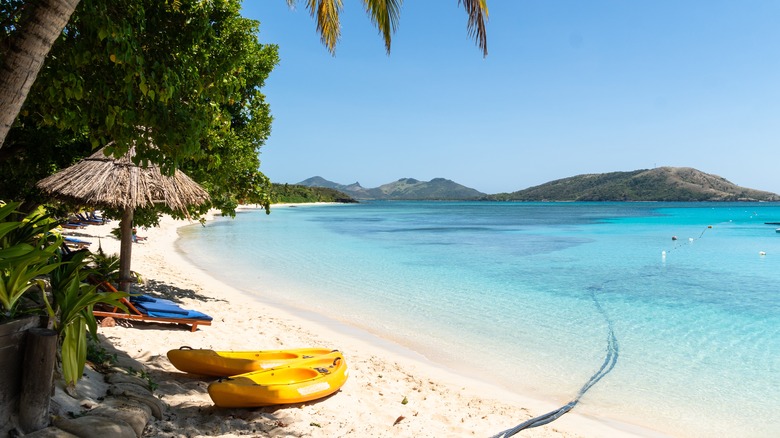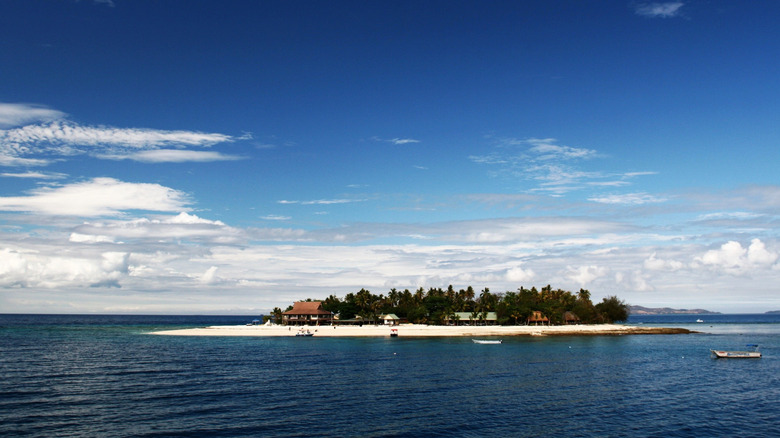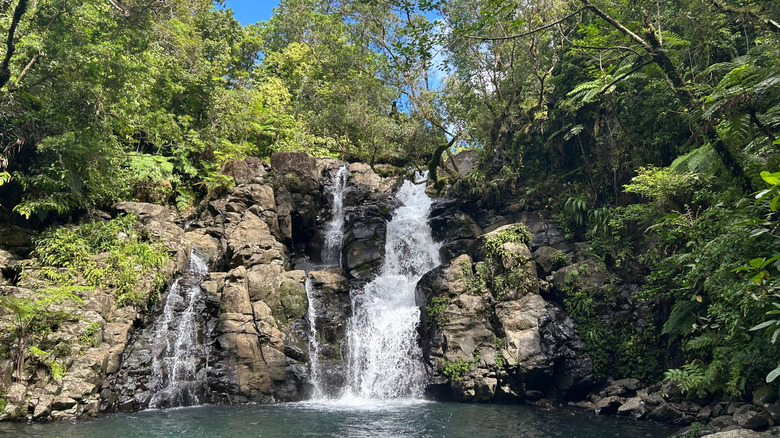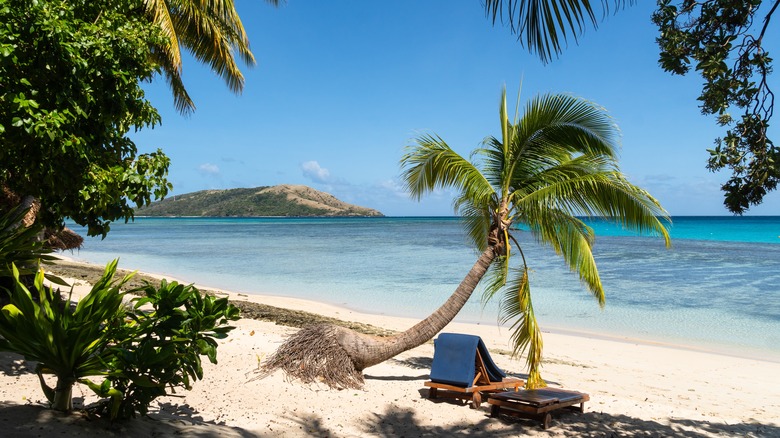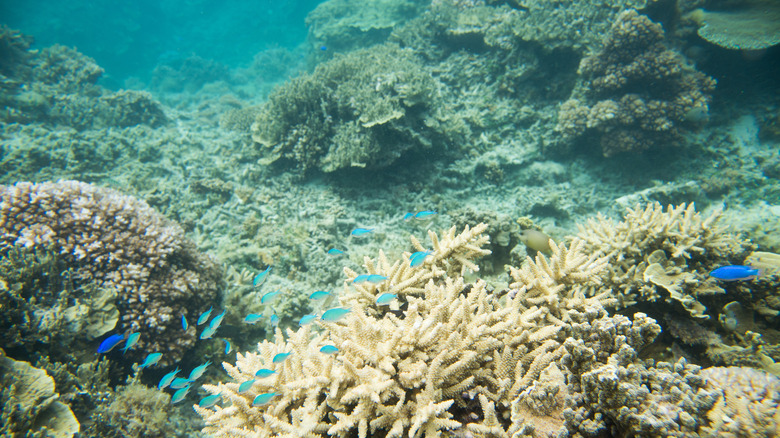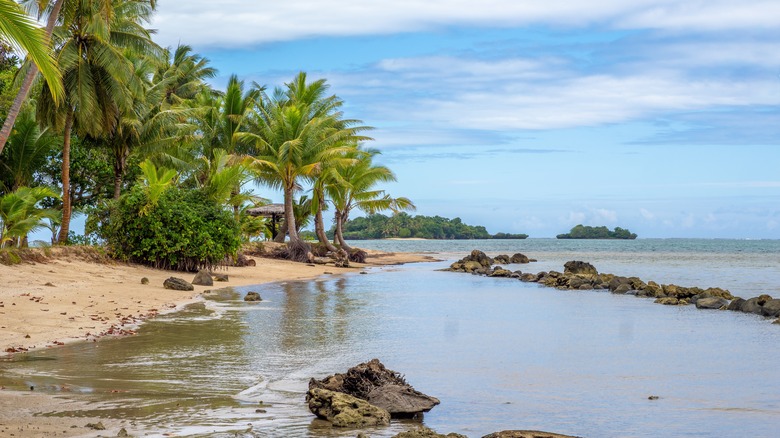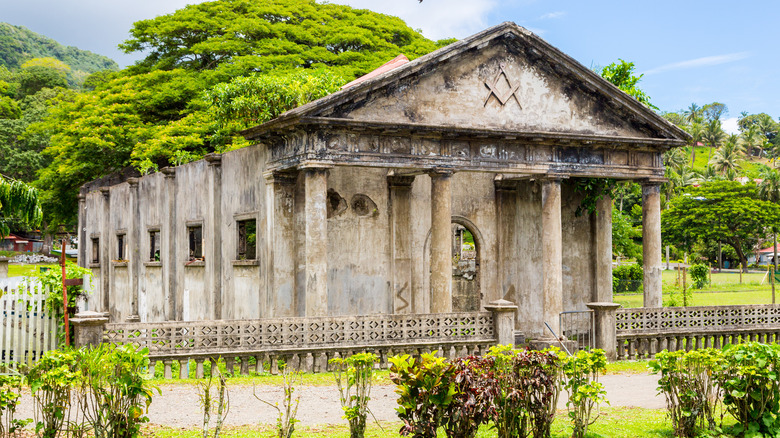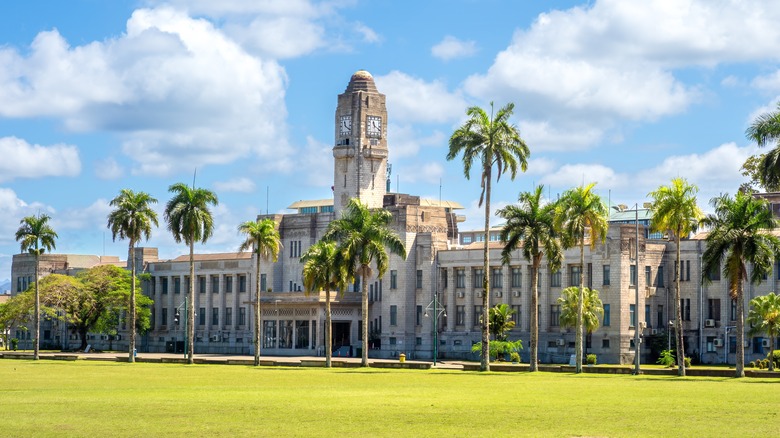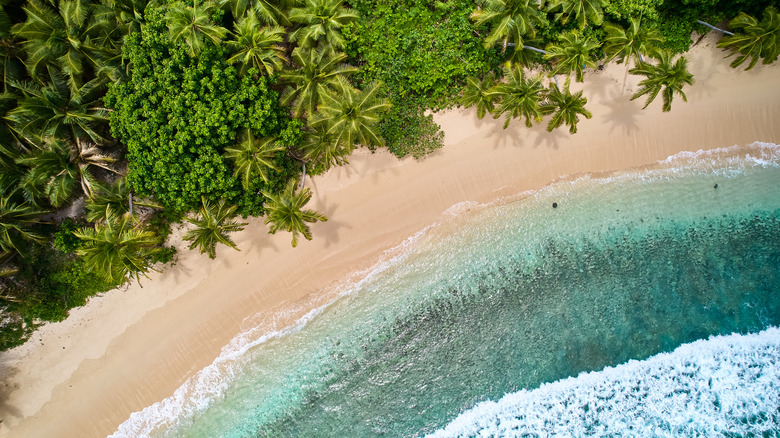The Safest Islands In Fiji To Visit For A Stress-Free Vacation, According To Research
Fiji is one of the world's premier tropical destinations, with over 330 islands spread across the South Pacific. This island nation offers an abundance of choices for travelers seeking both adventure and tranquility. But with so many stunning options available, selecting the best island in Fiji for your travel style can feel overwhelming, especially when safety is a top priority and there are many things to know before you go. The good news is that Fiji maintains an excellent safety record globally. The U.S. State Department categorizes the country as Level 1 in terms of safety and Americans can stay visa-free for up to four months. This classification puts Fiji on par with many popular destinations, like Japan, Portugal, and Switzerland. In fact, many European destinations have a Level 2 travel advisory, including the United Kingdom, France, and Spain.
While the country experiences occasional petty crime, particularly in nightlife areas, violent crime against tourists remains exceptionally rare. The Fiji Police shared on Facebook that during May 2025, crime had decreased 14% compared to May 2024. Last spring 2025, the police also reported an increase in illicit drug crime. Of the 215 cases recorded, 195 cases were marijuana-related and 20 cases were methamphetamine-related. The Fiji Times reported that there were 20,384 offenses recorded, many of them drug-related, because of the government's stricter enforcement. In the article, the Deputy Prime Minister and Finance Minister Professor Biman Prasad said, "It was imperative that members of the public understood that these statistics were not as alarming."
Fiji is overall a very safe destination, whether you're heading there for your honeymoon, a family retreat, or a getaway with your best friends. Tourists have shared their positive experiences on the islands online, so we've rounded up the safest islands in Fiji to visit, according to travelers.
Viti Levu
Viti Levu is Fiji's largest and most developed island, and will be your entry point into the country since it's home to Nadi International Airport and the country's capital city of Suva. It's a great choice for first-time visitors to Fiji and those seeking the convenience of landing in the country and not having to take a boat or another plane.
From a safety perspective, Viti Levu is mostly safe with the exception of Suva's nightlife area. The island's resort areas around Nadi are exceptionally safe, with plenty of hotels with their own security staff. However, travelers caution that Suva's nightlife area can be sketchy. Travelers on Reddit share that the area, especially around the bars and nightclubs in the evenings, can be home to petty crime and drug crime. The U.S. State Department's website warns that "several assaults and robberies have occurred in the bar and nightclub district of downtown Suva, the waterfront/seawall area during hours of darkness, as well as on Victoria Parade Street."
One Reddit user who lived in Suva for two years said that there were multiple attempted break-ins and robberies, but that violent crime is almost never random. Another advised, "You'll be totally fine in the daytime, but I would not recommend walking alone at all at night, it's best to taxi."
Mamanuca Islands
The Mamanuca Islands are located just off the western coast of Viti Levu, and represent one of Fiji's most accessible and budget-friendly island experiences. The chain of islands offers the perfect introduction to Fiji's other islands' experiences without venturing too far off the main island. Safety-wise, these islands are known for a low crime rate and friendly locals who are known for their warmth and hospitality toward visitors, creating an environment where tourists consistently report feeling welcome. The few incidents are mostly related to petty theft, and violent crime is extremely rare.
The most common safety concerns in the Mamanucas relate to basic travel precautions. Petty theft can occur if your valuables aren't left secured or left alone in public, and there are some occasional scams you should know about before visiting Fiji, especially in local markets and popular tourist areas. These include just overcharging tourists, and you can easily avoid this by researching prices beforehand, and knowing when to negotiate or walk away from overpriced offers. There is also a concern for food and water safety. While most resorts have high standards for making sure only filtered water is used in cooking, washing vegetables, and for drinking, some budget accommodations or local restaurants may not have those same standards. To minimize the risk, stick to well-reviewed establishments, drink and brush your teeth with bottled water, and order meat dishes thoroughly cooked.
If you're aware of these things, the Mamanuca Islands are a great place to visit for all travelers, from budget hostels to luxury resorts. The islands are famous for their pristine beaches, excellent snorkeling, and picturesque hiking trails that offer spectacular views of the country's many islands. There's a regular ferry that runs among the islands, making island hopping and exploring easy and affordable.
Taveuni
Taveuni, known as Fiji's "Garden Island," represents one of the safest destinations in the Fiji archipelago. This beautiful mountainous island offers visitors an opportunity to experience Fiji's natural beauty in an environment where safety concerns are minimal and the pace of life is slow and easygoing. In fact, one traveler on Tripadvisor even reported that they let their children go to the store alone. The residents and tourists report feeling very safe, even at night, and there's a low theft occurrence.
Taveuni's natural attractions are equally impressive and safely accessible. The island features some of Fiji's most spectacular waterfalls, including the famous Bouma Falls, aka Tavoro Falls, which can be reached via hiking a well-maintained path. The first of the three waterfalls is only a 10- to 15-minute walk on a paved path from the visitor's center, making it a very safe and accessible journey. The other two waterfalls take about 40 minutes to an hour to hike, and in some places can be uneven and slippery, according to one traveler's report on Tripadvisor, so that's something to be aware of if you're planning to explore the area on foot.
Yasawa Islands
The Yasawa Islands, a chain of 20 islands north of the Mamanucas, have earned a reputation as one of Fiji's best honeymoon and romantic getaway destinations. This group of islands offers dynamic landscapes, dreamy beaches, and a level of safety that makes them the perfect place for couples to enjoy their relaxing trip without worrying. Safety conditions throughout the Yasawa Islands are excellent, with multiple solo female travelers reporting feeling completely secure during their visits.
Most of the crimes that do occur there are petty and violent crime is extremely rare, travelers reported on Expat Exchange. However, safety precautions that should be used anywhere will still apply, like keeping an eye on your belongings, locking away valuables, and being aware of your surroundings. You should also be aware that the cyclone season runs from October to May, so if you plan on traveling during that time, make sure to be up-to-date on the weather and have travel insurance.
With those things in mind, the Yasawa Islands are an excellent choice for your getaway. There are several adults-only resorts, but also some budget-conscious options too. The islands are known for its amazing scuba diving or snorkeling for an affordable price, kayaking, hiking, or just relaxing on one of their beautiful, world-renowned beaches.
Kadavu
Kadavu is one of the best remote island destinations in Fiji for quiet escapes, untouched nature, and exceptional safety due to the lack of mass tourism. The small population of 8,700 have a more traditional way of life because the island is more remote. However, they are reportedly very welcoming to visitors. There's no significant crime or health risks, according to the official Kadavu tourism board. People come here for its exceptional diving and surfing, and it has some small hotels and resorts.
The reason Kadavu is known as a premier diving destination is because it's an outer island surrounded by the Great Astrolabe Reef. This is the world's fourth largest barrier reef and home to so many species of fish, sharks, tuna, and snappers. Because it surrounds a more remote island, this barrier reef hasn't suffered as much from mass tourism. One diver on Tripadvisor shared that the coral is "the best [they] have seen."
Because of the untouched nature of the island, bird-watching opportunities are spectacular. There are four species of birds found only on Kadavu Island and nowhere else in the entire world: the Kadavu Shining Parrot, the Kadavu Honeyeater, the Kadavu Fantail, and the Whistling Dove. There are also hundreds of other animal species that can be found throughout the island's tropical rainforests.
Vanua Levu
Vanua Levu is Fiji's second-largest island, and offers visitors a chance to experience a more authentic and less touristy side of Fiji while maintaining good safety standards and reasonable access to amenities. Often overlooked by mainstream tourism, the island offers excellent value and genuine cultural experiences for travelers willing to venture to a more unique destination for a quieter experience.
The safety levels in Vanua Levu are excellent, and visitors can expect to experience warm, Fijian hospitality and a more rural vibe. In fact, Vanua Levu, along with its neighbor Taveuni, are known as "The Friendly North" because the culture and locals are so hospitable. The island only has two towns, Labasa and Savusavu, and both offer plenty of things to do, such as restaurants, hikes, snorkeling, and more. Near Vanua Levu lies Rainbow Reef and the Great Sea Reef, two lively coral reef systems perfect for divers and snorkelers to see hundreds of fish in crystal-clear, warm waters.
One safety concern is the hurricanes which can hit this island and cause flooding, and the lack of infrastructure. Past travelers on Reddit have reported that there are some paved roads, but many are not. If you do opt to go from November to April, take note that this is hurricane season, one of the worst times to visit Fiji. However, digital nomads who have lived in the area say that the islands are prepared for cyclones. There are community shelters on the islands and resorts have emergency plans in place. You can also evacuate to a bigger island in some cases.
Ovalau and the Lomaiviti Islands
The Lomaiviti Islands, part of Fiji's eastern island chain, offer visitors the opportunity to explore an UNESCO World Heritage Site while experiencing one of the country's safest and most authentic island communities. The historic town of Levuka, Fiji's formal capital before it was moved to Suva in 1882, is a well-preserved historical town with a welcoming environment. It's located on Ovalau, which is only a 12-minute flight from Suva, with a friendly local population and fewer tourists than some other islands.
Safety conditions throughout the islands are exceptional, and its designation as an UNESCO World Heritage Site has brought international attention to the island. There are guided walking tours, where you'll get to see Fiji's first school, post office, and newspaper. It's also home to the Royal Hotel — a place open since the 1860s and the oldest hotel still operating in the South Pacific. Travelers on Expat Exchange report the locals being friendly and warm, describing them as "always ready to help and make them feel at home." The pace of life is slower, and there's a strong community in the town, where everyone knows everyone.
Levuka, travelers note, is exceptionally peaceful, with some incidents of petty theft and rarely any violent crime. One traveler on Tripadvisor even reported that a member of the hotel staff offered to take them on a hike — an experience that "would have been entirely impossible without local guides," they wrote. Accommodations are somewhat limited on the island, but there are some hotels and homestays available. Other than exploring the historic town, the Lomaiviti Islands are known for its amazing diving and snorkeling opportunities along with dolphin watching. You can go ziplining as well with the Ovalau Zipline Adventure company, which takes safety very seriously. They regularly do safety checks and train their staff extensively. They make sure every participant completes a safety orientation, including protocols, harness fitting, braking, and emergency training.
Lau Islands
The Lau Islands represent one of Fiji's most remote and adventurous destinations, offering visitors the chance to experience traditional Pacific Islander life, immersing yourself in the local communities away from mass tourism. The Lau Islands are remote and safe, because there are not many tourists visiting these islands. And like the other islands mentioned, the locals are known to be warm and hospitable.
Most people stay in local guest houses or in a homestay, a really authentic experience. These cost around $120 Fijian dollars (about $52 USD) per day, which also typically includes food, and can be arranged by the local government. The locals will sometimes even present you to the village chief as an honorable welcome. Those few people that do end up going all the way to the Lau Islands enjoy sailing, scuba diving, snorkeling, kayaking, relaxing on the quiet beaches, and exploring Lakeba's Caves. Many people enjoy drinking kava — a tea made from a root. The tradition is to share the tea by passing a coconut shell around as you sit in a circle.
One safety concern to think about is hurricanes and tropical storms. However, the Fijian government has recently invested in upgraded emergency facilities throughout the island group. The Ministry of Rural and Maritime Development and Disaster Management invested around $30,000 for a new evacuation center with washrooms and a kitchen, in case of an emergency, according to the Fiji government website.
How to stay safe in Fiji
Regardless of which Fijian island you choose for your vacation, following basic safety precautions will help ensure your trip remains memorable and positive. Use common sense, stay off your phone when walking, keep your valuables out of sight or locked in a safe back at your hotel, and taking a car home in the evenings are travel precautions that can be applied anywhere, but especially in Fiji. When exploring local markets or small shops, be sure to carry a little cash with you. While many places take credit cards, smaller local vendors may require cash. Don't carry too much cash or all your credit cards at once, just in case you are pickpocketed.
Health precautions are also essential for a safe trip to Fiji. Consult with your doctor beforehand to make sure you're in good health before venturing off to this remote country. There are no legal vaccination requirements to enter Fiji, but the Center for Disease Control recommends Hepatitis A, Hepatitis B, COVID-19, measles, rabies, typhoid, and routine vaccines. It's also good to note that you should not drink the tap water in Fiji, and rely on bottled water for drinking and brushing your teeth.
If you're planning on going to hurricane season, be sure to research emergency protocols for your island. Resorts and hotels have emergency plans in case, so you can communicate directly with them to make sure you're prepared. If you're staying in a homestay or other types of local accommodation, you can ask your host, research online, bring emergency equipment, and buy travel insurance that covers emergency evacuations.
Methodology
The methodology of this article relied on official data from the government, police, and news sources. We also factored in travelers' shared experiences online via travel blogs, social media sites and forums on Reddit, and travel ranking sites like Tripadvisor for a more well-rounded view of the islands from people who had already been there. Though individual island data was not available, we used nation-wide statistics and then relied on personal experiences on specific islands to gauge safety. Overall, Fiji is a very safe country and many travelers echoed that due to its welcoming culture, resort security, and many other factors.
